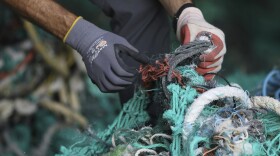Being Black in Hawaiʻi is a rare experience shared only by about three percent of the state’s population. But, what about being Black and adopted by Native Hawaiians? That’s the story of Hawaiian falsetto music star Kamakakēhau Fernandez – and the subject of an upcoming documentary.
Once Kamakakēhau Fernandez discovered the ʻukulele as a child there was no turning back.

The Nā Hōkū Hanohano award winning singer was raised in a strong Hawaiian household in Kahului. He grew up immersed in the culture and gained fluency in the Hawaiian language.
FERNANDEZ: Aʻo ʻia ke koʻikoʻi o ka maopopo ana i kou lāhui akā noʻu ʻo ka lāhui Hawaiʻi wale nō kaʻu e ʻike ai.
He says he was constantly reminded of the importance of knowing his identity, but the only identity he’s ever known has been Native Hawaiian.
Fernandez was born African American in Little Rock, Arkansas. He was adopted by a Native Hawaiian family on Maui when he just was six weeks old.

Learning that he was adopted didn't change the way he saw himself, but it did change how he saw the world.
FERNANDEZ: Kohu mea lā aia wau ma ke kai o ka manō.
He says being Black in America is like swimming in a sea of sharks.
Protests for social justice and the Black Lives Matter movement have forced Fernandez into deep introspection about what it means to be Black, adopted, and a son of Hawaiʻi.
His journey is the subject of an upcoming documentary called “Kamakakēhau: A Heart’s Desire,” which follows the singer as he traces his roots from Maui to his birth place in Little Rock and onto his ancestral homeland in West Africa.

Imani Altemus-Williams is producing the documentary for the Pōpolo Project – a Hawaiʻi non-profit aiming to redefine what it means to be Black in the islands.
“His story, I think is unique. But I think many of us also see different elements of ourselves in this story,” says Altemus-Williams, “What does it mean to be black? Are we black enough? And especially when we've grown up here and so far away from other parts of the diaspora that have more Black representation.”

Music will play a central role in the film as it has in Fernandez’s life. He plans to incorporate signature sounds from the journey into his music.
FERNANDEZ: I kaʻu komo ʻana i ke mele, ua hana wau e hoʻohanohano e hāʻawi mahalo i kaʻu mau aʻo. Akā ʻaʻole loa wau i ʻike i ia wā i ʻaneʻi ana koʻu alahele.
He says he initially got into music to show appreciation for what he had learned. He never thought music would lead him on this journey of self-discovery.




